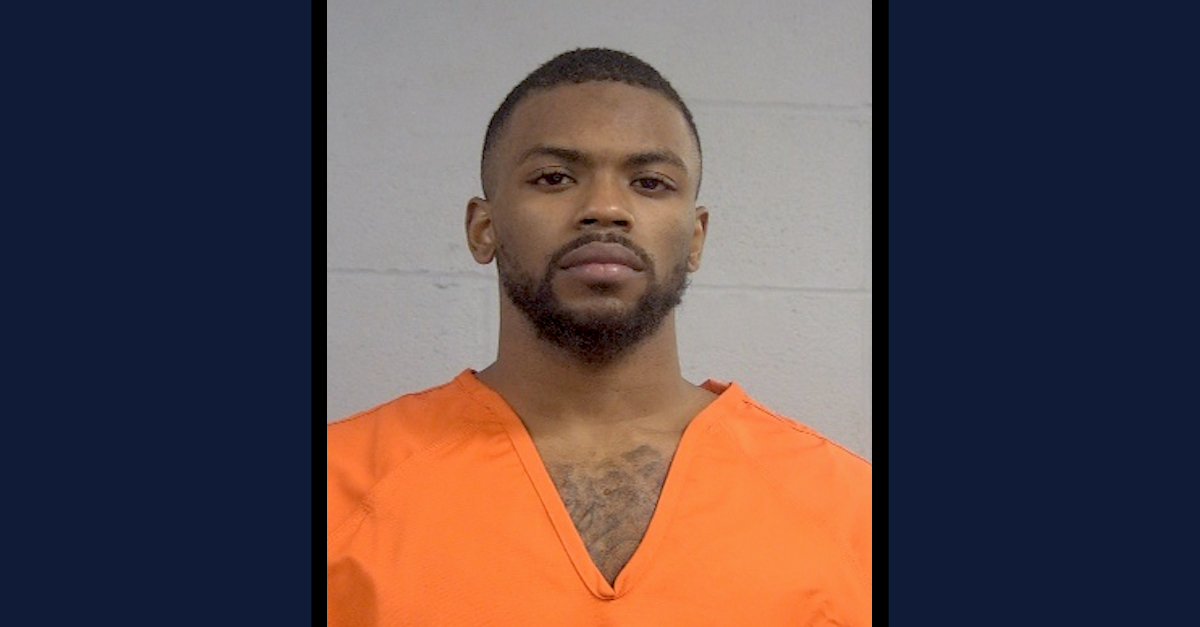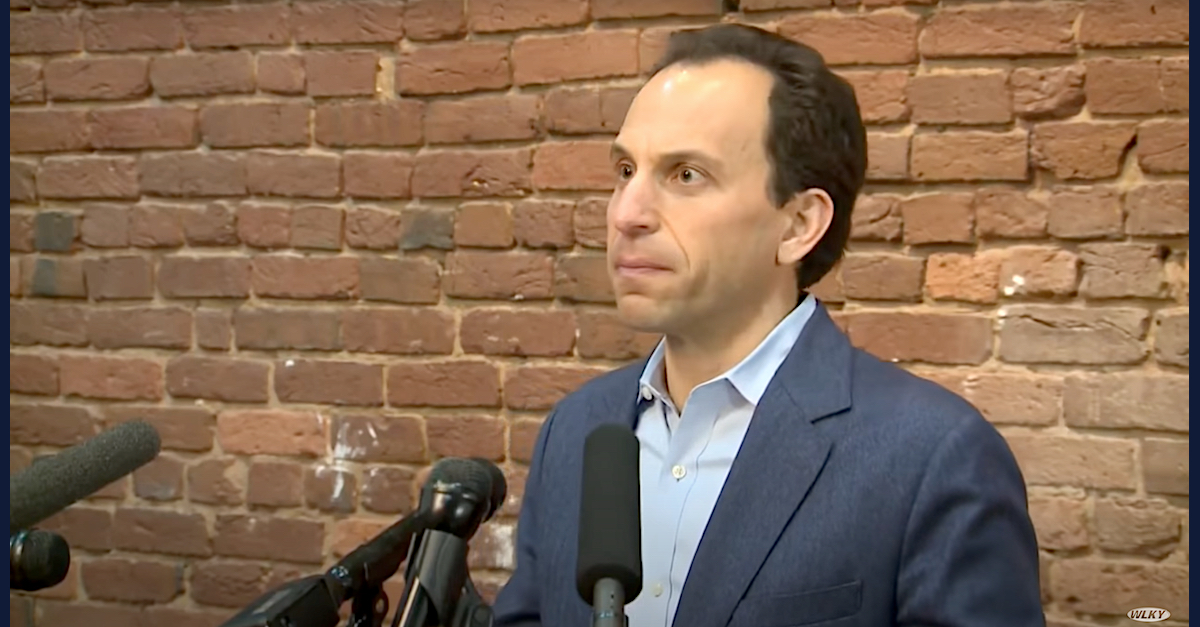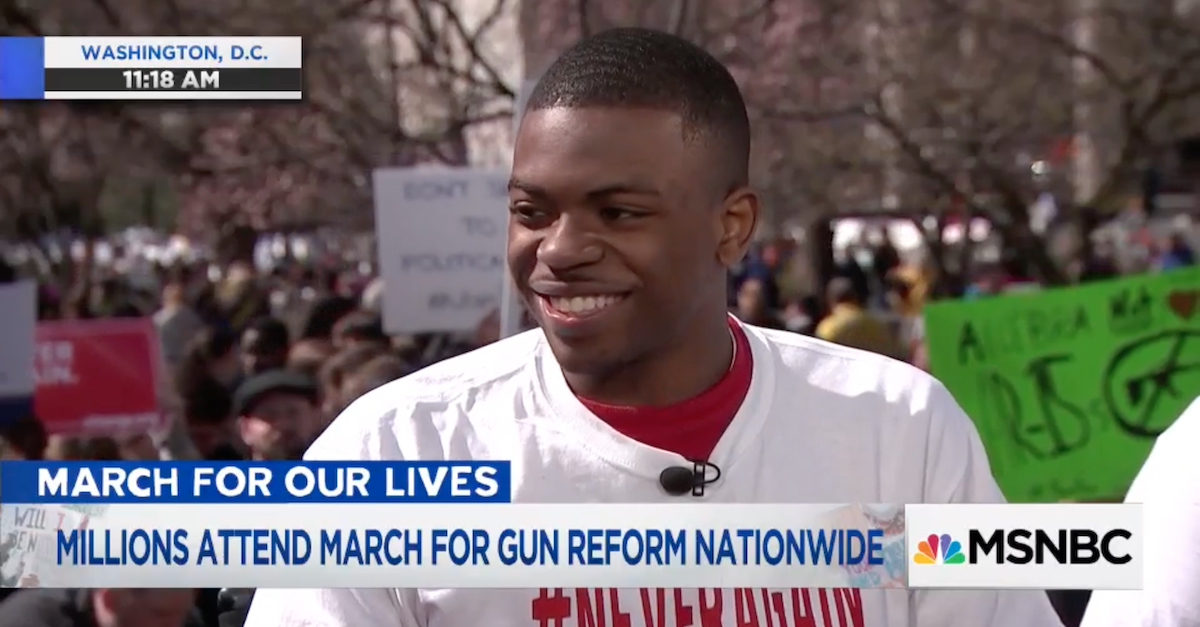
Quintez Omar Brown appears in a Louisville Metro Department of Corrections mugshot.
A former Black Lives Matter advocate from Kentucky has been indicted federally for allegedly shooting toward a candidate for mayor. His attorney on Friday quickly criticized the federal case against him and called the actions of federal agents “unlawful.”
Quintez O. Brown, 21, of Louisville, is charged with interfering with a federally protected right and using and discharging a firearm in relation to a crime of violence by shooting at and attempting to kill a candidate for elective office, according to a U.S. Department of Justice press release.
The first count of the indictment reads as follows:
On or about February 14, 2022, in Jefferson County, in the Western District of Kentucky, the defendant, QUINTEZ O. BROWN, by force and threat of force, did willfully intimidate and interfere with, and attempt to injure, intimidate and interfere with C.G., by shooting at him with a firearm, which is a dangerous weapon, because C.G. had been campaigning as a candidate for mayor of Louisville in a primary election, in order to intimidate C.G. from campaigning as a candidate for mayor of Louisville in a primary election. The offense involved an attempt to kill C.G.
The specific crimes alleged are violations of 18 U.S.C. § 245(b)(1)(A) and 18 U.S.C. § 924(c)(1)(A).
The candidate has long been publicly identified as Craig Greenberg (D), who was reportedly a frontrunner for the city’s highest office at the time of the attack.
The candidate described the incident in an interview with CNN shortly after it happened. Greenberg said one of the bullets grazed the back of his sweater — an account local police backed up at the time.
“We asked if we could help him,” Greenberg told the cable network. “And he pulled out a gun, aimed it directly at me and opened fire.”
“I was fortunate that one of my brave teammates slammed the door shut,” the candidate continued. “They were able to throw some desks on top of the door and the suspect fled. So, we are very blessed to be here today. All of us on the team are.”

Craig Greenberg. (Image via WLKY-TV/YouTube screengrab.)
A local police report obtained by the Courier-Journal alleged Brown pulled the trigger of a 9mm Glock handgun at about 10:15 a.m. on Feb. 14. Police officers caught the defendant ten minutes later “less than half a mile from the campaign headquarters” in the Butchertown Market area, the newspaper said; the loaded pistol was in his pants pocket, the police paperwork reportedly indicated.
Brown also was carrying an additional magazine and ammunition, the newspaper noted, again citing the police report.
News organizations nationwide were abuzz int he aftermath of the incident, and Brown’s advocacy work was previously detailed in an extensive Law&Crime report. For instance, Brown appeared on MSNBC in 2018 during a “March for Our Lives” gun control rally. During the appearance, Brown said gun violence was a problem and threatened to work to vote politicians “out of office” if they opposed gun reform measures.

Quintez Brown appeared on MSNBC in 2018. (Image via screengrab.)
According to federal court records, Brown’s defense moved on Wednesday to rubbish the case completely. Part of that argument is connected to concomitant state court proceedings.
Brown is also facing state charges of attempted murder and four counts of wanton endangerment, according to multiple news reports. The attempted murder charge is technically punishable by 10 to 20 years behind bars, but the Courier-Journal that “[w]hen no one is injured” in an attempted murder case, “the offense is considered nonviolent and the offender is eligible for parole after serving 20% of the sentence.”
Defense attorney Patrick J. Renn argued Friday via federal court documents that a state circuit court judge found “that Brown was suffering from a significant mental illness, and incarceration would be a detriment to his physical and mental well being.” Brown, therefore, was released from state custody on house arrest, and his state court case was continued to June 9.
The defense continued:
On April 6, 2022, federal agents converged on the residence where Brown was serving his home incarceration. The agents entered the home and unlawfully seized and arrested Brown on a federal warrant that had not been unsealed. The federal agent’s actions violated the terms of Brown’s release, as ordered by the Jefferson Circuit Court. After unlawfully seizing and arresting Brown, he was transported to the Grayson County Jail and incarcerated. Brown remains incarcerated under federal custody.
Brown refused to allow a federal court hearing to proceed via videoconference on Thursday, April 7, the document continued. An in-person hearing was scheduled for Friday, April 8, and the government asked that Brown be “detained” and “held in federal custody,” the document states.
That, the defense asserted, is wrong.
“[T]he Federal Court lacked jurisdiction over Brown’s person, since he was being held on State criminal charges at the time federal agents unlawfully seized and arrested him,” the argument states (in part).
A footnote elucidates further:
During the scheduled “Initial” Hearing, the prosecutor for the Government advised the Court, and Brown, that the Government agents seized and arrested Brown without having first obtained a writ of habeas corpus ad prosequendum. Instead, the prosecutor claimed the “State” gave the federal agents “permission” to seize and arrest Brown, contrary to the order of the Jefferson Circuit Court.
The main argument picks up from there:
The actions of the federal government, and its agents, in unlawfully seizing and arresting Brown, who suffers from a significant mental illness, violates his constitutional rights; specifically the Fifth, Sixth, Eighth, and Tenth Amendments to the United States Constitution.
Part of that argument continued:
The Eighth Amendment to the United States Constitution precludes the Government from inflicting “cruel and unusual punishments.” This prohibition applies with greater force where an individual is presumed innocent, and has not been convicted of any criminal offense. An Indictment is a mere accusation against an accused, and issued based only on probable cause. Two judges – – in the Jefferson District Court, and the Jefferson Circuit Court of Kentucky – – determined Brown should not be incarcerated prior to trial based on his significant mental health issues. Brown was ordered released by the Jefferson Circuit Court, and specifically authorized to receive mental health treatment. The Government, and its agents, by unlawfully seizing and arresting Brown, and incarcerating him in a county jail prior to trial constitutes cruel and unusual punishment.
The defense also raised double jeopardy arguments with regards to the joint state and federal prosecutions of the defendant.
The indictment and the defense arguments, along with a few other cursory documents from the case file, are below: